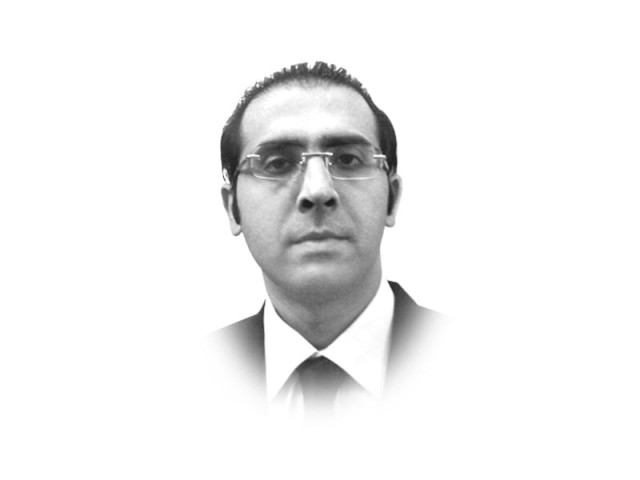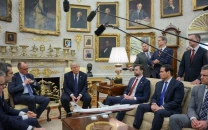Turf wars
While independence of Judiciary is vital, is the value of judicial independence enough to override democracy itself.

The opposition, both inside and outside of parliament, has decided to weigh in — in favour of the Court. Some like, Imran Khan, Lt-Gen (r) Hamid Gul and Gen (r) Aslam Baig have demanded an unbelievably drastic solution to the conflict, that the Supreme Court asks the armed forces to send the government packing. The nerve of the two retired generals and their concern for judicial independence and democracy is astounding, given their rather stellar records in this respect.
The primary argument is regarding the ambit of powers of both the government and the Supreme Court. The transfer and posting of government officials is admittedly an exclusive executive function and hence, is the primary argument of the federal government. The position of the Supreme Court is that the Court is empowered to interfere in executive appointments when it has a direct bearing on a matter or investigation before the Court. This is of course a reductionist rendition of the two positions but it does in my opinion capture the essence of the dispute. Both arguments are defensible and the constitutional nuances are certainly beyond the scope of an opinion piece. However, what remains glaringly conspicuous in the ongoing episode is the territorial language employed by both parties.
The conflict in itself is not exceptionally troubling and is even somewhat common in democracies. Ms Indira Gandhi’s stand-off with the then Indian Supreme Court and FDR’s (Franklin D Roosevelt’s) altercation with the US Supreme Court being prime examples. The disturbing part is the impression of a menacing, ‘last man standing’ duel. At the very core of our crises as a nation, is the confusion regarding which values should be ascribed primacy. As an example, judicial independence is a value that has to be instituted and safeguarded in any functioning democracy. The next logical question in our particular case is, whether the value of judicial independence is salient enough to override democracy itself. There are no easy, one-dimensional answers to this question. Yet, now would be the right time to attain equilibrium. And in my opinion the single most important value is democratic governance in this mix.
The lawyers movement of 2007-08 was a revolution in our context in almost every sense of the word. However, like most revolutions, it went past its intended mark. The lawyers are now ready to take to the streets cheering for the Supreme Court at the drop of a hat. There are two problems with this overzealousness; firstly, the august Supreme Court does not require street power on a regular basis. And secondly, the intimacy between the bar and the bench is unbecoming of both. To torture a cliché which is awkwardly applicable here is, ‘familiarity breeds contempt’. The lawyers are not supposed to act as the foot soldiers of the judiciary in democratic times.
As for the federal government, it is admittedly attempting to stall the implementation of the Supreme Court orders and needs to be condemned in the strongest possible terms for that. However, that does not justify an appeal to demagogy. The government has the right to appeal and ask for a review of Supreme Court orders but not to refuse implementation. On the other hand, the Supreme Court has stopped giving legal rationales for their pronouncement and the rhetoric now is focused on insaaf (justice) as opposed to qanoon (law). The distinction is not trivial. The administration of justice as opposed to law has a Solomonic tinge to it, unfettered by petty legal provisions. While that may be an admirable ideal in a utopian world, for regulating ordinary mortals it has all the makings of totalitarianism. I have no doubts regarding either the intention or the capabilities of the eminent judges of the Supreme Court. Yet taking suo motu cognisance of postings of particular bureaucrats and overruling the executive on a regular basis does not seem befitting of the apex court. Random charity is disturbing since it can by applying the same principles lead to nightmarish unfairness. The Supreme Court keeps itself occupied with a handful of high profile matters while everyday appeals are routinely placed on the back-burner. One is reminded of Judge Sturgess, who once said: “Justice is open to everyone, like the Ritz Hotel.”
At the risk of repetition, any system which allows unelected people to make all important executive decisions is either tyrannical or just one step removed, and is certainly not worth the gamble. This applies to military dictatorship, charlatans calling for khilafat and with the utmost of deference to the Supreme Court. I have no intention of defending the corrupt governance or downplay the vigilant role of the Court. However, the impression that is being conveyed right now is that the Supreme Court does not deem the present government worthy enough to govern. The problem with this condescending view is that it is the same scorn and distrust of the elected representatives that has plagued us periodically with military activism.
As for the government, it has to realise that perpetuating the victim image and portraying the Supreme Court as the oppressor is not likely to work in the long run. Both parties to the conflict see it as a win-lose situation and there lies the problem. The Supreme Court and the federal government should be mature enough through painful experiences, to learn that the existence of democratic governance and judicial independence is only possible through coexistence. Hence, serious attempts should be made to make the system work, even if it is driven by self-preservation. The khakis have utter contempt for both the parliamentarians and the judiciary. Nobody should be allowed to play the benevolent king or the big brother here. Democracy and judicial independence can either stand separately or will fall together.
Published in The Express Tribune, August 2nd, 2011.















COMMENTS
Comments are moderated and generally will be posted if they are on-topic and not abusive.
For more information, please see our Comments FAQ